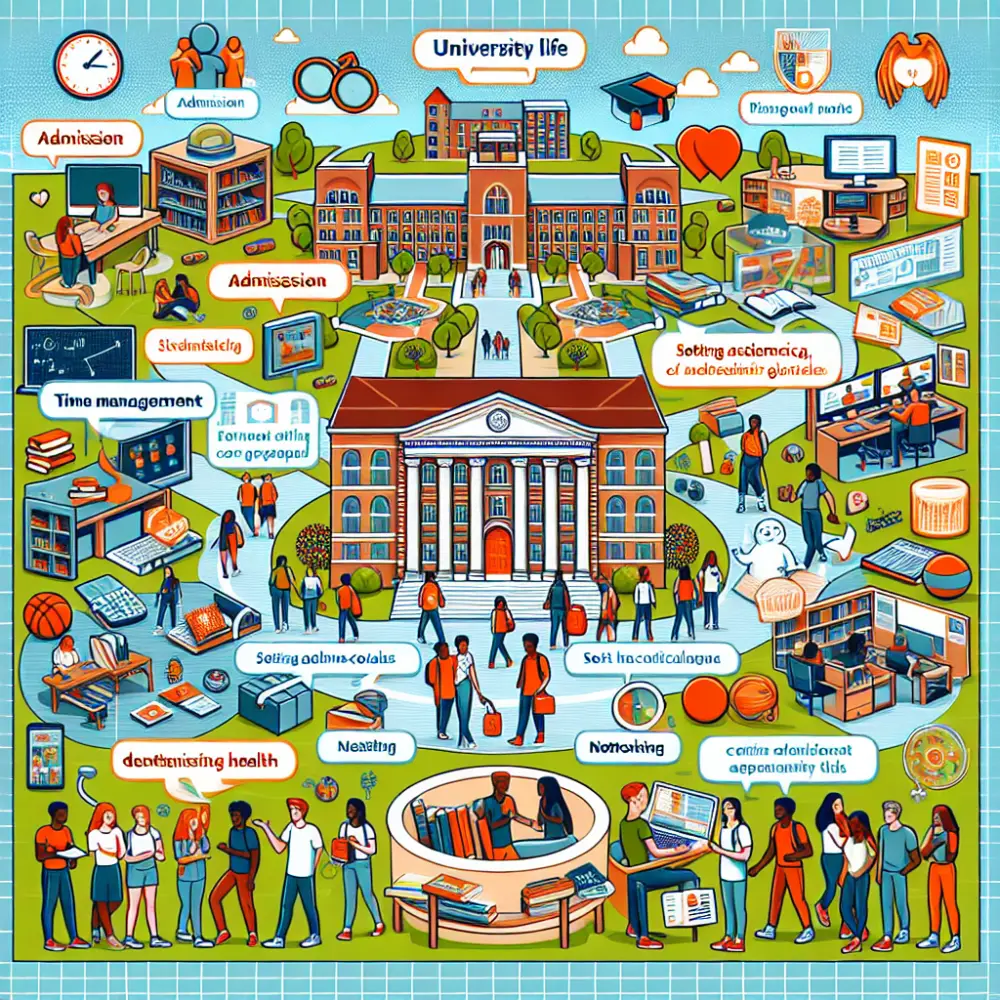
Navigating University Life: A Comprehensive Guide for New Students
University life marks the beginning of an exciting chapter in a student’s journey, filled with opportunities for personal growth, learning, and new experiences. However, transitioning from high school to university can also be a challenging experience, especially for students who are venturing into this new phase for the first time. This guide offers insights and tips to make this journey smoother and more rewarding.
Setting Foundations for Success
Finding the Right Balance
Balancing academics, social life, and personal responsibilities can be tricky. Students should start by planning their schedules carefully, dedicating specific times for studying, attending classes, and socializing. Using a planner or digital calendar can help manage time effectively.
Building a Support Network
One essential factor in thriving at university is establishing a strong support network. Students can begin by building relationships with roommates, classmates, and professors. Joining clubs and organizations related to their interests or fields of study is also a great way to meet new people with similar passions.
Academic Excellence
Attending Classes and Managing Coursework
Consistently attending classes and keeping up with assignments is crucial. Active participation in class discussions can enhance understanding and retention of material. Similarly, managing coursework with a systematic approach, such as breaking large projects into smaller tasks, can help prevent last-minute stress.
Utilizing University Resources
Most universities offer various academic resources like libraries, writing centers, and tutoring services. These resources can provide guidance and support, helping students excel in their studies. Taking advantage of these facilities can significantly improve a student’s academic experience.
Navigating New Environments
Adapting to Campus Life
For many students, especially international ones, adapting to a new environment can be overwhelming. Understanding campus layout, familiarizing oneself with essential services, and participating in orientation programs can ease this transition.
Cultural Adjustments for International Students
International students often face unique challenges, such as language barriers and cultural differences. Embracing cultural diversity and being open to learning from others can enrich their university experience. Those planning to study abroad, for instance, in Canada, need to start with understanding how to apply for a student visa.
How to Apply for a Student Visa in Canada
Researching Requirements and Documentation
International students looking to study in Canada must first ensure that they are eligible for a student visa. Key requirements generally include a letter of acceptance from a designated learning institution, proof of sufficient financial support, and a valid passport.
Attending an Interview and Securing a Permit
As part of the application process, students may be required to attend an interview. This is an opportunity to demonstrate genuine intent to study in Canada. Upon approval, students receive a study permit, allowing them to pursue their academic goals.
Financial Planning and Scholarships
Budgeting Tips
University education comes with its financial challenges. To manage expenses effectively, students should create a budget that accounts for tuition, books, housing, and day-to-day expenses. Seeking employment opportunities on-campus can also provide extra financial support.
Exploring Scholarship Opportunities
Scholarships are a great way to alleviate financial burdens. Students should research available options both locally and internationally. For example, the €5,000 Nokia Visiting Professor Scholarship in Finland is one such opportunity that can aid in funding international academic pursuits.
Maintaining Health and Well-being
Physical and Mental Health Care
University can be stressful, hence maintaining good health is paramount. Students should aim to have a balanced diet, regular physical activity, and enough rest. Accessing mental health resources available on campus, such as counseling services, is also beneficial.
Coping with Stress and Pressure
Engaging in activities like yoga, meditation, or even a simple walk can be effective stress relievers. It’s important to address stress early and seek professional help if needed, to prevent it from impacting academic performance and personal life negatively.
Embracing New Opportunities
Gaining Practical Experience
Internships and part-time jobs related to a student’s field of study provide valuable industry experience. These roles not only offer practical knowledge but also enhance a resume, making graduates more competitive in the job market.
Volunteering and Social Engagement
Participating in volunteer activities is another way to build skills and contribute to the community. Whether it’s related to their academic field or a personal interest, volunteering can broaden a student’s perspective and introduce them to diverse circles.
Planning for the Future
Setting Career Goals
While focusing on academics, students should also turn their attention toward career planning. Setting clear, achievable goals early on helps direct academic efforts towards a desired career path. Universities often offer career services to assist students with career exploration, resume writing, and job interviews.
Networking and Building Professional Relationships
Developing professional relationships can be achieved by attending career fairs, industry events, and workshops. Networking not only increases job prospects but also keeps students informed about industry trends and opportunities in their fields.
Conclusion
Navigating university life may initially seem daunting, but with the right strategies and resources, students can make the most of this pivotal time. Striking a balance between studies and social activities, utilizing available resources, and planning ahead for financial and career success will prepare students for a fulfilling university experience and beyond. Remember, the journey is as important as the destination, and the skills and habits developed during university can lay a strong foundation for future endeavors.












